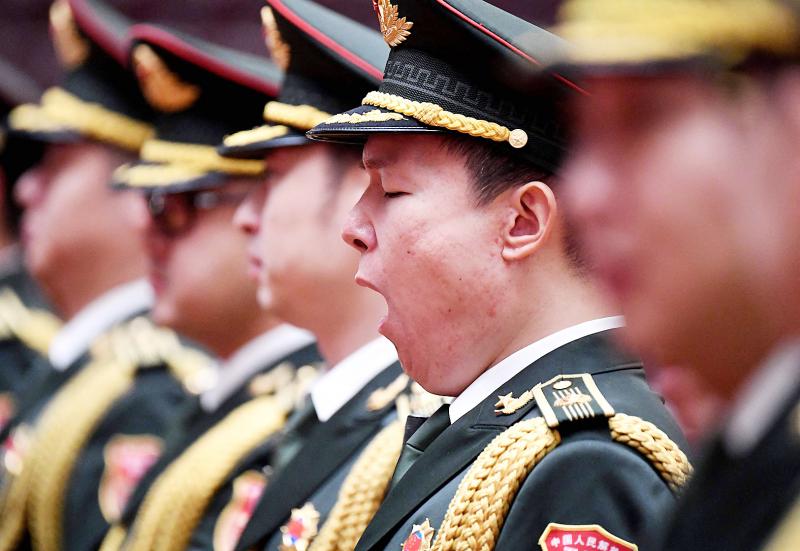Chinese state media have sought to quiet online speculation that a conflict with Taiwan might be imminent, in a sign of how heated rhetoric between Washington and Beijing was feeding public concern about the risk of war.
Chinese social media networks have seen a flurry of chatter about a possible Taiwan crisis in the past few days, seemingly fueled by Beijing’s call for citizens to stockpile food and an unrelated message claiming to show the nation was preparing to mobilize military reserves.
The surge came after a report by China’s state broadcaster saying that Taiwanese were hoarding their own survival supplies.

Photo: AFP
On Tuesday, the Economic Daily published a commentary urging the public “not to over-read” a Chinese Ministry of Commerce statement encouraging families to stock up on some daily necessities due to supply-chain concerns.
Then, late on Tuesday, a social media account affiliated with the official People’s Liberation Army Daily newspaper denounced the mobilization rumors as a “vile” and “malicious fabrication.”
“It will not only cause negative impact to the state, the military and society, it could also lead to severe consequences,” said the account, Junzhengping.
One screenshot of a text message widely circulated on social media urged reserves to “get ready for being recalled at any time” because “the Taiwan issue was very grim.”
Yesterday morning, the Junzhengping denial was among the top-trending topics on the Weibo social media network.
Still, the war talk continued to simmer, with a 63-year-old video of Chinese People’s Liberation Army generals singing that they “will definitely plant the flag of victory on Taiwan” getting more than 130 million views.
The controversy shows the challenge Chinese President Xi Jinping’s (習近平) government faces in trying to manage Chinese public sentiment over Taiwan, even with its vast censorship powers. Over months of saber-rattling over Taiwan, authorities have sometimes needed to step in to tone down the rhetoric and at other times faced backlash for perceived weakness.
The official China Daily newspaper warned in an editorial on Sunday that President Tsai Ing-wen (蔡英文) and her Democratic Progressive Party (DPP) were “leading Taiwan to an abyss.”
The paper cited a senior Chinese official’s pledge to spend the nation’s “post-unification” revenue on improving the well-being of its citizens as a remark that shows “confidence that the Taiwan question will be settled in the foreseeable future.”
Hu Xijin (胡錫進), the editor-in-chief of the Chinese Communist Party’s Global Times newspaper, offered a strategic rationale for the government’s rhetoric in a commentary published on Monday.
Hu said that “peaceful reunification” would likely result from applying enough pressure to make the DPP leadership believe it had no choice but to surrender.
“Personally, I believe there is still a chance for peaceful reunification, but it must be based on the condition that the DPP authority feels cornered and will perish if they do not accept reunification,” Hu said.

A magnitude 5.6 earthquake struck off the coast of Yilan County at 12:37pm today, with clear shaking felt across much of northern Taiwan. There were no immediate reports of damage. The epicenter of the quake was 16.9km east-southeast of Yilan County Hall offshore at a depth of 66.8km, Central Weather Administration (CWA) data showed. The maximum intensity registered at a 4 in Yilan County’s Nanao Township (南澳) on Taiwan’s seven-tier scale. Other parts of Yilan, as well as certain areas of Hualien County, Taipei, New Taipei City, Taoyuan, Hsinchu County, Taichung and Miaoli County, recorded intensities of 3. Residents of Yilan County and Taipei received

Taiwan has secured another breakthrough in fruit exports, with jujubes, dragon fruit and lychees approved for shipment to the EU, the Ministry of Agriculture said yesterday. The Animal and Plant Health Inspection Agency on Thursday received formal notification of the approval from the EU, the ministry said, adding that the decision was expected to expand Taiwanese fruit producers’ access to high-end European markets. Taiwan exported 126 tonnes of lychees last year, valued at US$1.48 million, with Japan accounting for 102 tonnes. Other export destinations included New Zealand, Hong Kong, the US and Australia, ministry data showed. Jujube exports totaled 103 tonnes, valued at

TRUST: The KMT said it respected the US’ timing and considerations, and hoped it would continue to honor its commitments to helping Taiwan bolster its defenses and deterrence US President Donald Trump is delaying a multibillion-dollar arms sale to Taiwan to ensure his visit to Beijing is successful, a New York Times report said. The weapons sales package has stalled in the US Department of State, the report said, citing US officials it did not identify. The White House has told agencies not to push forward ahead of Trump’s meeting with Chinese President Xi Jinping (習近平), it said. The two last month held a phone call to discuss trade and geopolitical flashpoints ahead of the summit. Xi raised the Taiwan issue and urged the US to handle arms sales to

BIG SPENDERS: Foreign investors bought the most Taiwan equities since 2005, signaling confidence that an AI boom would continue to benefit chipmakers Taiwan Semiconductor Manufacturing Co’s (TSMC, 台積電) market capitalization swelled to US$2 trillion for the first time following a 4.25 percent rally in its American depositary receipts (ADR) overnight, putting the world’s biggest contract chipmaker sixth on the list of the world’s biggest companies by market capitalization, just behind Amazon.com Inc. The site CompaniesMarketcap.com ranked TSMC ahead of Saudi Aramco and Meta Platforms Inc. The Taiwanese company’s ADRs on Tuesday surged to US$385.75 on the New York Stock Exchange, as strong demand for artificial intelligence (AI) applications led to chip supply constraints and boost revenue growth to record-breaking levels. Each TSMC ADR represents